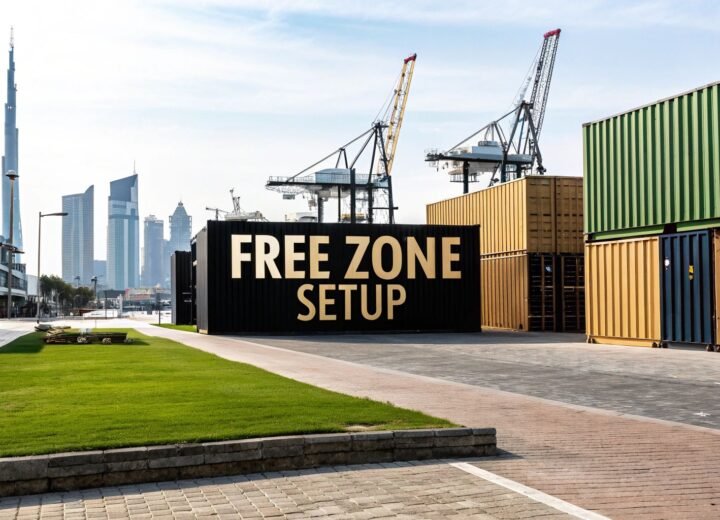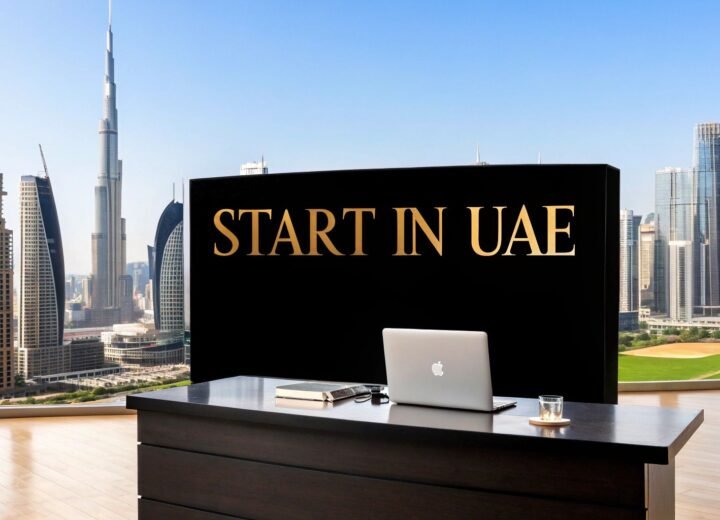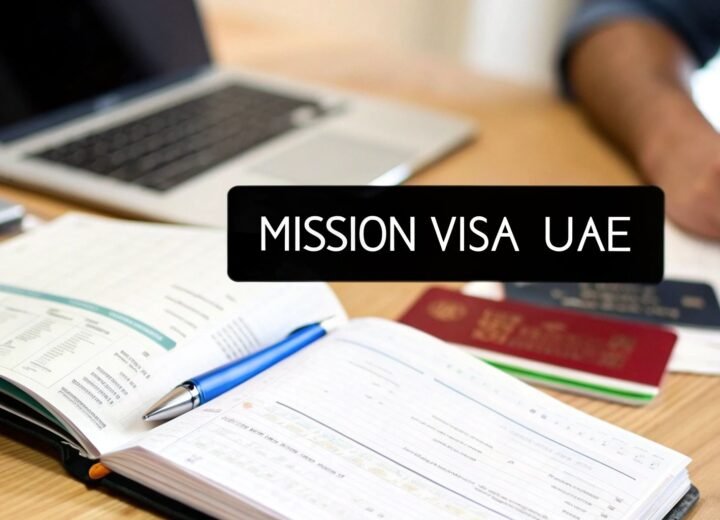If you're looking to tap into the entire UAE market, setting up a business on the Dubai mainland is the way to go. This isn't just about getting a licence; it's a strategic decision that gives you the freedom to trade locally, bid on government projects, and set up a physical shop anywhere you want. It's the ideal path for entrepreneurs who are serious about long-term growth and establishing a real presence here.
Your Gateway to the UAE Market
Choosing a mainland company in Dubai defines your market reach from day one. It's a completely different ball game compared to a free zone setup.
Free zone companies are typically confined to their specific economic area, but a mainland licence breaks down those walls. It gives you the freedom to operate across all seven emirates. That means you can sell your products, offer your services, and even open new branches from Abu Dhabi to Fujairah without needing a local distributor to act as a middleman.
This kind of unrestricted access is a massive plus for any business that wants to reach a broad customer base. Think about it: if you're in retail, a mainland licence lets you open a flagship store in The Dubai Mall, a small boutique in Jumeirah, and a warehouse in Al Quoz—all under a single company. A consulting firm can work directly with clients and government bodies across the country, something that’s often a hurdle for free zone entities.
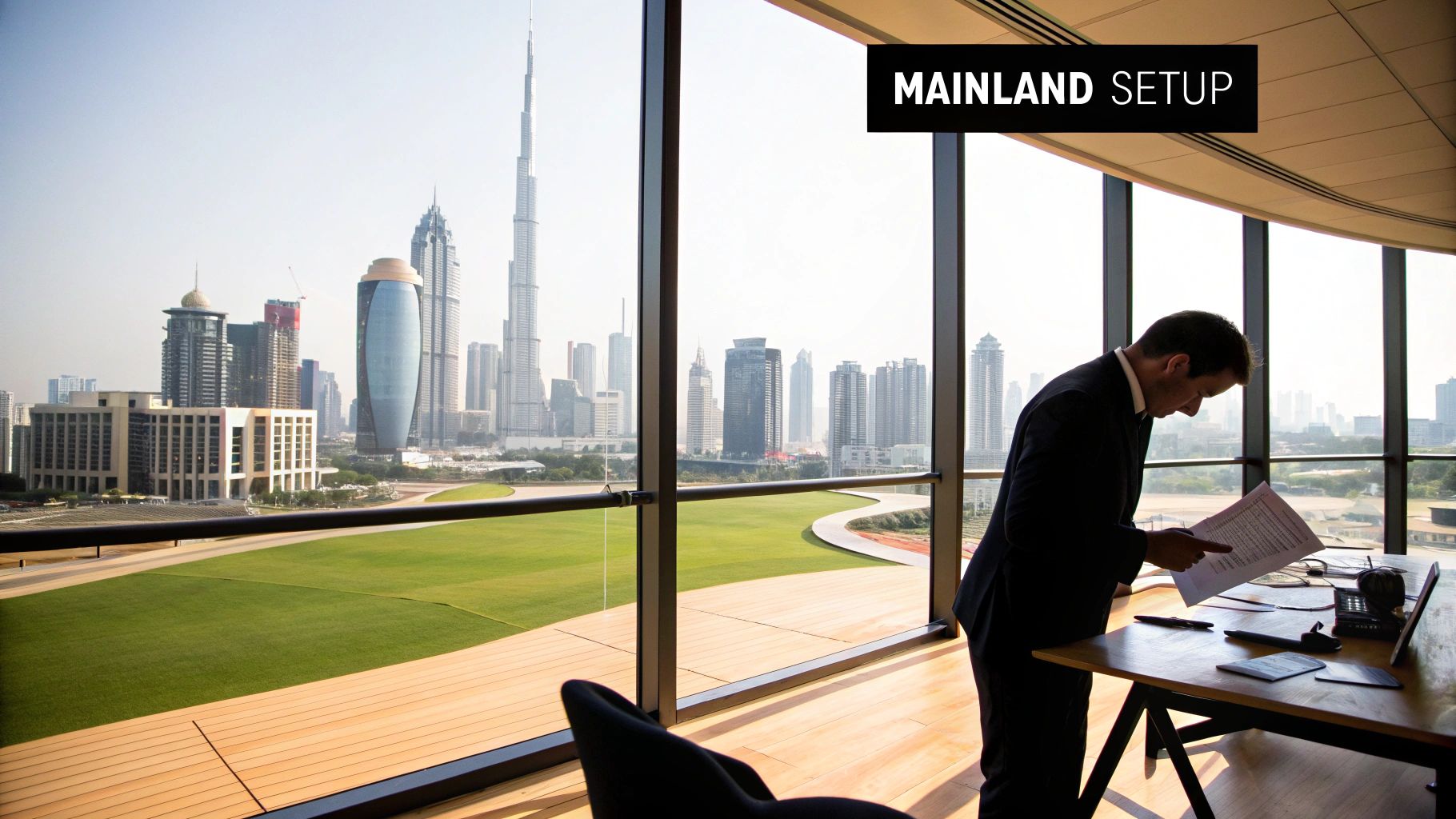
Strategic Advantages of a Mainland Licence
The benefits go far beyond just being able to operate anywhere. A mainland setup equips your business with some powerful advantages that are crucial for scaling up in the region.
Here’s what you really gain:
- Access to Government Contracts: This is a big one. Only companies registered on the mainland can bid for lucrative government tenders, which are a major source of revenue in the UAE.
- Unlimited Visa Potential: The number of visas you can get is tied to your office space. The bigger your office, the more staff you can hire. This gives you the flexibility to grow your team as your business expands.
- Diverse Business Activities: Dubai's Department of Economy and Tourism (DET) provides a list of over 2,000 business activities. This means you have a huge scope of operations you can run, often under a single licence.
The whole process is managed by the DET. While in the past you would have needed a local sponsor, recent reforms have opened the door for 100% foreign ownership in many sectors. For most professional services, you'll just need a Local Service Agent (LSA) to handle government paperwork, but they won't hold any shares in your company.
This framework gives you a secure and flexible foundation to build your business, whether you're focused on the UAE market or looking at global expansion. You can get a deeper understanding of the entire journey by checking out our guide on how to start a business in the UAE.
Before you can even start scouting for office locations or applying for visas, there are two foundational decisions you need to make for your Dubai mainland company. These are your business activity and your company’s legal structure.
Getting these two elements right from the very beginning is absolutely critical. They set the stage for everything that follows—from the type of licence you'll need and the ownership rules you must follow, to your personal liability and the company's potential for growth.
Think of it this way: choosing the wrong setup is like building a house on a shaky foundation. Imagine setting up as a consultancy under a commercial licence, only to find out later that a professional licence would have given you better ownership terms and lower setup costs. It’s a common misstep, but one you can easily sidestep with a bit of foresight.
Picking Your Core Business Activity
First things first, you need to define exactly what your business will do. Dubai's Department of Economy and Tourism (DET) has a massive list of over 2,000 approved business activities, and your job is to find the one that fits your operations best. This isn't just a tick-box exercise; it directly dictates which trade licence you'll be applying for.
Most activities fall into one of three main licence categories, each designed for different types of businesses:
- Commercial Licence: This is your go-to for any business involved in trading—buying and selling goods. This covers everything from general trading and retail shops to real estate agencies.
- Professional Licence: Tailored for service-based businesses that leverage the intellectual or creative skills of their owners. Think marketing agencies, IT consultancies, and design studios.
- Industrial Licence: If you're involved in manufacturing, production, or any form of industrial processing, this is the one you'll need. This could be anything from a food processing unit to a metal fabrication workshop.
The choice you make here has real-world consequences. A general trading company with a commercial licence can deal in a huge range of products, but it will face different capital and ownership requirements than an IT consultancy with a professional licence. That same consultancy, for instance, can often benefit from 100% foreign ownership simply by appointing a Local Service Agent (LSA).
One of the most common pitfalls I see is entrepreneurs choosing an activity that’s too restrictive. It’s often smarter to pick an activity that not only covers your current plans but also leaves room for future services you might want to offer. This can save you the headache and cost of amending your licence down the road.
Comparing Mainland Business License Types
To help you visualise the differences, here’s a quick breakdown of the main licence categories. Each one serves a distinct purpose and comes with its own structural nuances.
| License Type | Primary Scope | Typical Ownership Structure | Best For |
|---|---|---|---|
| Commercial | Trading, buying, and selling goods and commodities. | Typically an LLC, allowing for 100% foreign ownership. | Retailers, import/export businesses, general trading. |
| Professional | Providing services based on professional expertise or skills. | 100% foreign ownership with a Local Service Agent (LSA). | Consultants, designers, accountants, IT specialists. |
| Industrial | Manufacturing, processing, and assembling goods. | Requires a physical factory or workshop and specific approvals. | Manufacturers, food processors, assembly plants. |
Understanding these distinctions is key to aligning your business model with the correct legal framework from day one.
Deciding on Your Company's Legal Form
With your activity chosen, the next step is to select a legal structure. This defines how the business is owned and, crucially, who is responsible for its debts and obligations. For most entrepreneurs setting up on the Dubai mainland, the decision usually boils down to two popular options.
A Sole Establishment is straightforward—it's owned by a single person who is personally liable for all company debts. It’s a simple structure often chosen by professionals offering their individual expertise. The downside? There's no legal separation between you and the business, which can be a significant personal risk.
On the other hand, the Limited Liability Company (LLC) is by far the most common and versatile structure for mainland businesses in Dubai. An LLC creates a separate legal entity, which means your personal assets are shielded from the company's finances. Your liability is limited to your investment, offering an essential layer of protection.
For a closer look at this structure, our in-depth guide covers everything you need to know about an LLC company formation in Dubai mainland. It's the ideal framework for businesses with multiple partners or ambitious growth plans, providing a solid and scalable foundation.
As you weigh your options, try to think beyond today. Where do you see your business in five years? Will you need to bring on investors? Do you plan on branching out? Choosing a legal structure that aligns with your long-term vision is one of the smartest moves you can make.
Navigating the Documentation and Approval Maze
Alright, you’ve picked your business activity and sorted out the legal structure. Now comes the part that often feels like a mountain of paperwork and red tape: getting all the necessary documents and approvals in place. From my experience, this is where many people get bogged down. But if you tackle it methodically, it’s far less intimidating than it looks.
The whole journey really kicks off with one key milestone: getting the Initial Approval from the Department of Economy and Tourism (DET). Think of this as the government’s initial nod of approval, a green light confirming they have no objections to your proposed business. This is the foundational permit you need before you can move on to anything else, like reserving your company name.
Securing Your Initial Approval and Trade Name
To get that all-important initial approval, you'll need to present a clear business plan along with passport copies for every shareholder. The authorities want to see that your venture is legitimate and understand who's behind it. Don't underestimate this step; it's a critical checkpoint before you start spending serious money.
At the same time, you’ll be reserving your trade name. This isn't just a creative exercise; your name has to be unique and follow the UAE’s rules. That means nothing offensive, no religious references, and it can't be too similar to an existing company's name. It's smart to get this done early because this exact name will be on every official document you have, from your trade licence to your bank statements.
This simple flow chart gives a good visual of how these first steps fit together.
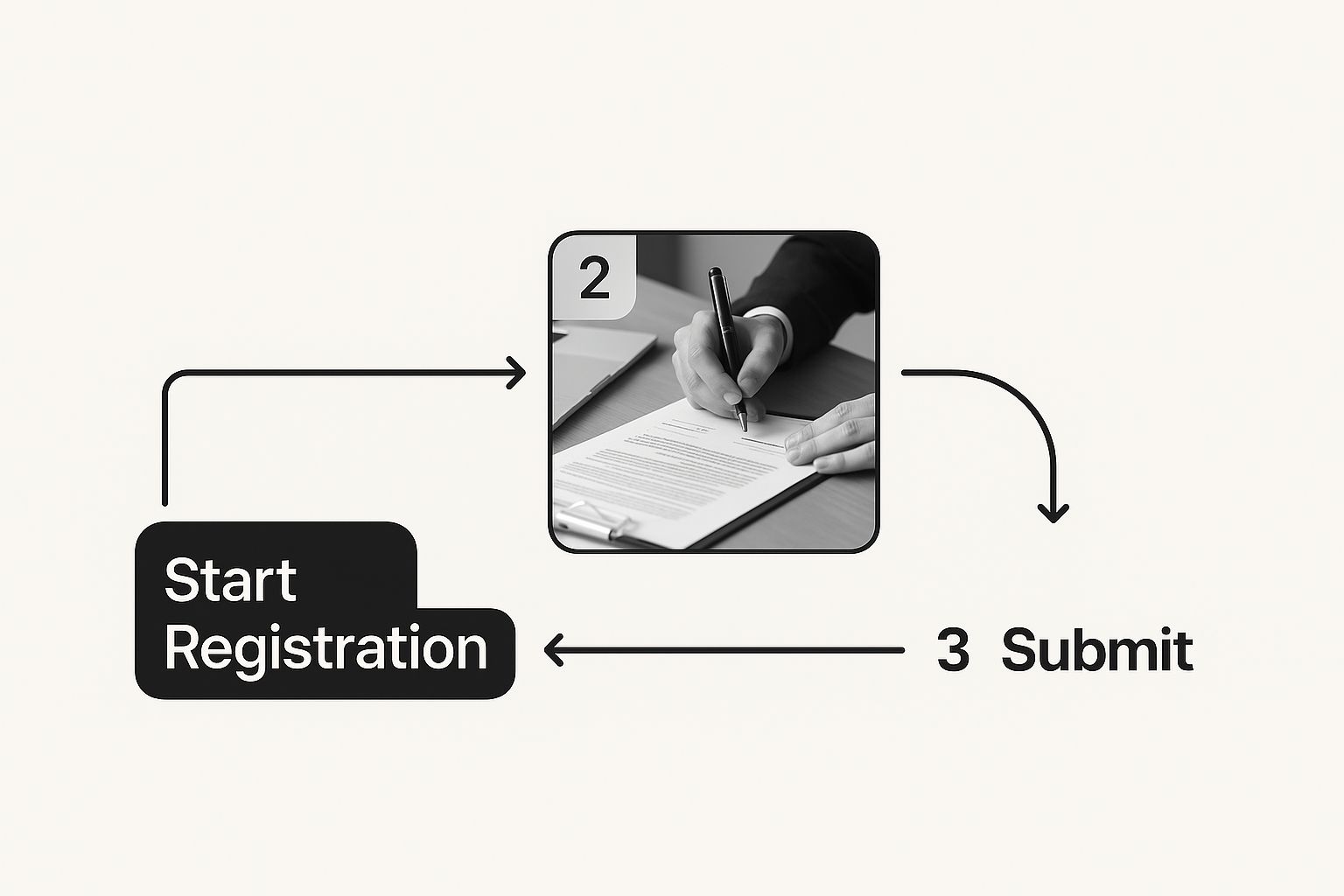
Seeing it laid out like this really helps clarify how each approval builds on the last, pushing you forward toward that final licence.
Crafting Your Legal Foundation
With your initial approval and trade name in hand, the next big job is drafting and notarising your company’s Memorandum of Association (MoA). This document is, for all intents and purposes, the legal constitution of your business. It’s a binding contract that spells out exactly how your company will run.
A solid MoA will always cover these key points:
- Shareholder Details: A clear list of all partners and what percentage of the company they each own.
- Business Activities: An exact breakdown of the services or trade your company is licensed for.
- Capital Contribution: The amount of capital each shareholder has invested.
- Profit and Loss Distribution: The specific arrangement for how profits (and losses) will be shared.
This document has to be drafted in both Arabic and English and then officially notarised by a public notary here in Dubai. Take your time with it. Any mistakes or vague language can cause massive disputes down the road.
I’ve seen it happen time and again: people use a generic MoA template and regret it later. It's always worth customising the document to reflect your specific agreements, especially when it comes to management roles and exit strategies. A little foresight here can prevent major headaches as the business grows.
A major shift in recent years has made a mainland company setup in Dubai much more attractive. Historically, foreign investors needed an Emirati partner holding a 51% stake. But since the reforms in 2021, 100% foreign ownership is now possible for a huge range of business activities. For certain professional licences, you might still need a Local Service Agent (LSA) to handle government-related admin, but they won't hold any shares.
Finalising Your Physical Presence
The last piece of the documentation puzzle is your office lease. A physical office is a non-negotiable requirement for a mainland company in Dubai. Once you've signed a tenancy contract for your commercial space, the next step is to register it with Ejari, the official online portal for lease registration.
That registered Ejari certificate is absolutely essential for your final trade licence application. It’s the official proof of your physical address, and it's also directly linked to how many employee visas you can get. Without it, your application simply won't proceed. Getting your lease and Ejari sorted is the final crucial step before you can submit everything for your licence.
Decoding the Costs of Your Mainland Setup
Getting a handle on the budget for your mainland company setup in Dubai is, without a doubt, one of the most important first steps you'll take. While Dubai is known for being pro-business, you need to know exactly where your money is going to avoid any nasty surprises down the line. The total cost isn't a single number; it's a mix of fixed government charges and other costs that shift depending on what your business actually does.
Having a clear financial roadmap from day one is crucial. It lets you put your funds where they're needed most and helps you sidestep the common financial hiccups that can stall the whole process. Get this right, and you can focus on what matters: building your business, not chasing down unexpected bills.
Core Government Fees
No matter what kind of mainland company you're setting up, there's a set of mandatory government fees you'll have to pay. These go to the Department of Economy and Tourism (DET) and other authorities. Think of these as the fundamental, non-negotiable costs.
Here’s a quick breakdown of the usual one-time charges you can expect:
- Trade Name Reservation: This is a small but essential fee to lock in your business name so no one else can use it.
- Initial Approval Certificate: This is what you pay for the DET to give your business concept and its partners the preliminary green light.
- Memorandum of Association (MoA) Attestation: Your company’s rulebook, or MoA, has to be legally notarised. The fee here is usually tied to your company's share capital.
- Final Trade Licence Issuance: This is the big one—the main fee for your official licence to operate. The cost varies quite a bit depending on your specific business activity and legal structure.
These fees really form the baseline of your setup expenses. They're the price of entry for doing business in the Dubai mainland market.
Unpacking the Variable Costs
Once you move past the standard government payments, you'll encounter several variable costs that can really change your total investment. These expenses are directly linked to the choices you make for your business, and this is where having a savvy setup consultant can save you a lot of money.
I’ve seen it time and time again: entrepreneurs fixate on the licence fee and completely underestimate recurring costs like office rent. A truly cost-effective setup isn't just about finding the cheapest licence; it's about building a sustainable financial foundation that will actually support your business for years to come.
Here are the main variable costs you need to plan for:
- Office Rent and Ejari: A physical office space is a must for a mainland company, and rent is often the biggest variable cost you'll face. The price can swing wildly depending on the location, size, and quality of the building. You'll also need to register your lease through the Ejari system, which has its own fee.
- Local Service Agent (LSA) Fees: If your business offers professional services (like a consultancy), you'll need a Local Service Agent. This is an annual fixed fee, not a profit share, and typically runs between AED 8,000 and AED 15,000 per year.
- External Ministry Approvals: Some business activities, such as those in healthcare, education, or food trading, require special permits from other ministries or government bodies. Each of these approvals comes with its own fee, adding another layer to your total cost.
Real-World Cost Scenarios
To make this all a bit more tangible, let's look at a couple of different business models. Keep in mind these costs are just estimates to give you an idea and can change, but they really show how different choices affect the final budget.
| Cost Component | Scenario 1 A Solo IT Consultancy | Scenario 2 A Small Retail Shop |
|---|---|---|
| Trade Licence & Govt. Fees | Approx. AED 18,000 | Approx. AED 25,000 |
| Local Service Agent Fee | Approx. AED 10,000 (Annual) | N/A (LLC Structure) |
| Small Office Space Rent | Approx. AED 30,000 (Annual) | Approx. AED 70,000 (Annual) |
| External Approvals | Typically None | Municipality Approval (Approx. AED 1,000) |
| Estimated First-Year Cost | Approx. AED 58,000 | Approx. AED 96,000 |
As you can see, a service-based business like a consultancy often has a lower barrier to entry than a retail shop that needs a prime physical location and more complex approvals. By carefully planning for both the fixed and variable expenses, you can approach your mainland company setup in Dubai with total financial confidence.
What To Do The Moment You Get Your Trade Licence
That feeling of holding your new trade licence for the first time is a huge milestone. It’s the official green light, but it’s not the finish line. Now the real work begins, transitioning from paperwork to practice and setting up the foundations for your company's daily operations and long-term growth.
The steps you take right after getting licenced are just as critical as the application process itself. This is where you establish your company’s financial and legal footing in the UAE, which unlocks your ability to hire staff, manage money, and operate without a hitch. Getting this phase right sets you up for a smooth launch, helping you avoid those early administrative headaches that can really kill your momentum.

Open Your Corporate Bank Account
First things first: get a corporate bank account opened. This is non-negotiable. Your company is its own legal entity, and its finances must be completely separate from your personal accounts. It's a fundamental requirement for financial transparency and proper bookkeeping here in the UAE.
Don't expect to walk into a bank and open an account in an hour, though. Banks in Dubai have very strict Know Your Customer (KYC) procedures and will want to see a comprehensive set of documents to verify your business.
Be ready to provide the following:
- The original trade licence.
- Your company’s Memorandum of Association (MoA).
- Passport and visa copies for all shareholders.
- The Emirates ID of the account signatory.
- Proof of your business address (your Ejari certificate).
Some banks might even ask for a detailed business plan or projections of your financial activity. My advice? Shop around. Talk to a few different banks, as their requirements, fees, and account features can vary quite a bit.
Get Your Company's Immigration File Activated
With your licence sorted, the next move is to get your company registered with the immigration authorities so you can sponsor employees—including yourself. This starts by applying for an Establishment Card, sometimes called a Company Immigration Card. Think of this as your company’s official file with immigration.
Without this card, you simply cannot apply for any visas. It’s the crucial document that links your trade licence to the immigration system, giving you the authority to bring people on board. The application is usually quite straightforward and is a key part of any mainland company setup in Dubai.
A classic mistake new entrepreneurs make is forgetting that their office size dictates their visa allowance. Your employee visa quota is directly tied to the square footage of your registered office. If you plan to grow your team, you need to choose a workspace with enough room from day one.
Secure Your Investor Visa and Start Sponsoring Staff
Once the Establishment Card is in hand, you can finally apply for your own residence visa under the company you just created. As the owner, this is typically an investor or partner visa. It's a multi-stage process involving an entry permit, a medical fitness test, and finally, getting the visa stamped in your passport and receiving your Emirates ID.
This process cements your legal status as a resident investor in the UAE, allowing you to live here and manage your business on the ground. For a more detailed look at the paperwork and procedures, check out our guide on the https://prodesk.ae/investor-visa-uae-requirements/.
After your own visa is squared away, you can begin sponsoring your team. The process is similar, requiring work permits and residence visas for your employees. Just remember that your visa quota is in play here, so make sure you've got the office space to match your hiring plans.
Finally, a strong market entry is everything for a new mainland company. For anyone just starting out in Dubai, getting a handle on digital marketing for small business in the region is essential for grabbing that early traction and building a loyal customer base right out of the gate.
Still Have Questions About Setting Up on the Mainland?
Diving into the specifics of a mainland company setup in Dubai always brings up a few key questions. It's completely normal. Getting these details straight from the start is what separates a smooth launch from one bogged down by delays and confusion.
The rules of the game have changed dramatically for foreign entrepreneurs in recent years. It wasn't long ago that having a local Emirati partner holding 51% of your company was the only way forward. Thankfully, sweeping legal reforms now allow for 100% foreign ownership across a huge list of commercial and industrial activities.
Do I Still Need a Local Partner?
This is probably the most common point of confusion I see. Let's clear it up.
For the vast majority of businesses, especially those in trading or manufacturing, the requirement for a local sponsor is a thing of the past. You can own your business outright.
However, if you're setting up a professional services company—think consultancies, law firms, or creative studios—you'll need what's called a Local Service Agent (LSA).
An LSA is a UAE national who essentially acts as your company's representative for licensing and government paperwork. The crucial difference? They hold zero shares and have no say in your operations. You maintain full control and simply pay them an agreed-upon annual fee for their service.
Mainland vs. Free Zone: What's the Real Difference?
This is the other big question that business owners grapple with. The choice you make here has a massive impact on how and where you can operate.
-
A mainland company gives you unrestricted access to the entire UAE market. You can trade directly with any customer, open an office anywhere in Dubai, and—importantly—bid on lucrative government contracts.
-
A free zone company is generally limited to doing business within its specific zone or internationally. If you want to sell your products or services on the mainland, you'll usually have to partner with a local distributor, which adds a layer of complexity and cost.
The right choice really boils down to your business model. If your primary customers are within the UAE or you plan to work with government entities, a mainland license isn't just an option; it's a necessity for direct access and long-term growth.
Think of a mainland setup as your all-access pass to the entire UAE economy.
Ready to start your business journey in Dubai with experts who understand every detail? At PRO Deskk, we provide complete, hassle-free solutions for your mainland company setup in Dubai.
✅ Specialists in Mainland Company Formation in Dubai, Sharjah & Abu Dhabi
✅ Specialists in Freezone Company Formation across the UAE
✅ Specialists in Golden Visa on Property and Investor Visa
✅ Specialists in Corporate PRO Services and Attestation Services
✅ 24/7 Support Service – Always here when you need us
✅ Cost-Effective Business Setup Solutions tailored to your needs
✅ Enjoy UAE Tax Benefits for International Entrepreneurs
📞 Call Us Now: +971-54-4710034
💬 WhatsApp Us Today for a Free Consultation
Or visit our website at https://prodesk.ae to learn more.


